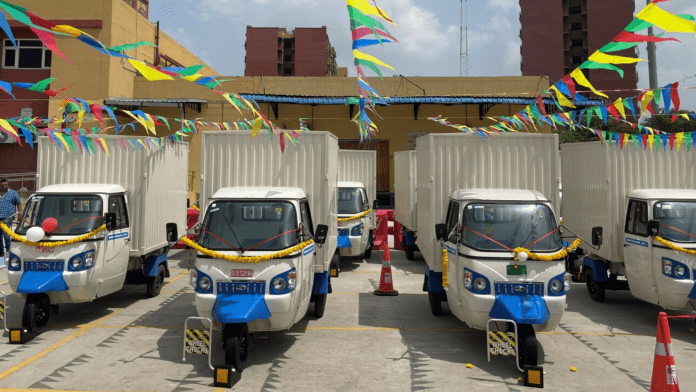Ecommerce giant Amazon has made a significant stride in India by launching its last mile fleet program with an exclusive fleet of 100% electric vehicles (EVs), marking a global first for the company. This initiative aims to aid over 300 Delivery Service Partners (DSPs) in conducting customer deliveries without producing any tailpipe emissions.
After experiencing success in North America and Europe, Amazon’s worldwide last-mile fleet initiative is expanding its reach to India. The program will introduce custom-designed electric EVs tailored to offer Delivery Service Partners (DSPs) convenient access to dependable, high-quality zero-emission vehicles for their last-mile delivery operations.
The introduction of the India fleet precedes the Diwali festival, and additional electric three and four-wheel vehicles will be gradually incorporated in the future.
In India, the program offers Delivery Service Partners (DSPs) access to tailored EVs designed for last-mile deliveries. It encompasses maintenance, charging, and parking facilities. These vehicles come equipped with advanced safety features, enhancing the safety of Amazon’s delivery partners and the neighborhoods they serve. Additionally, the data generated by these vehicles enables Amazon to optimize deliveries, ensuring both safety and punctuality.
“We are committed to be net-zero carbon by 2040, and decarbonising our delivery network is an important part of getting us to that goal,” said Abhinav Singh, VP of Operations, Amazon India.
Tom Chempananical, director of Global Fleet and Products, at Amazon, said, “These vehicles will raise the bar for last-mile delivery services, helping us deliver packages to our customers safely, reliably and efficiently.”
The ecommerce giant has strategic plans to gradually incorporate a substantial portion of last-mile delivery vans into its program over the next two years, with the ultimate goal of including all such vans. As part of the initial phase, the company has introduced specially equipped Mahindra Zor Grand three-wheeler EVs for Amazon’s last-mile deliveries.
The Mahindra Zor Grand is an eco-friendly electric three-wheeler meticulously crafted for streamlined last-mile logistics. Featuring a spacious 170 cubic feet delivery box and a robust 400kg payload capacity, it proves to be an ideal choice for managing daily shipments, particularly in regions with subpar air quality.
Amazon has introduced a fleet of more than 6,000 electric vehicles for package delivery across 400+ cities in India, with a target to expand this fleet to 10,000 by the end of 2025.
This progress is in accordance with the government’s initiatives aimed at encouraging electric vehicle (EV) adoption in India, contributing to the reduction of carbon emissions.
In October, India achieved a notable milestone with over 70,000 electric two-wheeler registrations, signifying four months of continuous growth. According to Vahan data as of October 31, these registrations experienced a month-on-month increase of 9.8%, totaling 70,248 units.
International corporations are placing a strong emphasis on ESG (Environmental, Social, and Governance) considerations, leading to an increased commitment to promoting the adoption of electric vehicles (EVs).
Flipkart, Zomato, and Swiggy have forged partnerships with multiple EV manufacturers to expedite the integration of electric vehicles (EVs) into their logistics fleets.
For instance, the rival of Amazon, Flipkart, has announced its plan to deploy 25,000 EVs by 2030 in a move to electrify its fleet.
Likewise, Swiggy has collaborated with the Taiwanese battery-swapping solutions provider, Gogoro, to advance the use of electric smart scooters for last-mile deliveries throughout India.
Lately, India has witnessed the emergence of numerous cleantech startups that are introducing innovative solutions to support the nation’s clean energy objectives. Among these startups are names like 75F, Ace Green Recycling, CleanMax Enviro Energy Solutions, GPS Renewables, ION Energy, and others.
Amazon is proactively investigating low-carbon fuels, adopting energy-efficient advancements, and channeling investments into renewable energy initiatives as part of its strategy to curtail emissions stemming from electricity production. In a recent development, the e-commerce behemoth unveiled a 198-megawatt wind farm located in Osmanabad, Maharashtra, India. This announcement signifies Amazon’s 50th renewable energy endeavor in the country, elevating its total capacity to over 1.1 gigawatts.
The company’s objective is to completely sustain its worldwide operations using 100% renewable energy by 2025.





